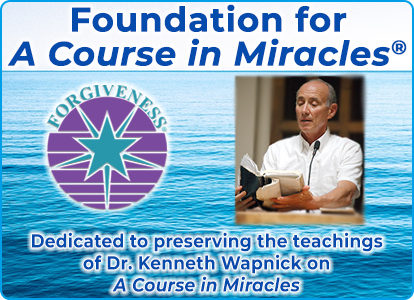
Click on an excerpt, audio or video tab to open.
Click on an excerpt, audio
or video tab to open.
Best Viewed in Landscape
Q: When I perceive an attack that seems totally unwarranted—and this can be a mere comment someone makes that makes me feel invalidated—my reaction is one of intense anger and hatred to the point that, if I could and get away with it, I would kill the other person. With these feelings of invalidation and indignation, I can feel like a door mat. This is a sticking point for me, because if I don’t succumb to the anger and attack back, and I pray to the Holy Spirit for help instead, I just feel flat and unmotivated, and feel like trash.
As I understand it, what has happened is the experience of indignation and invalidation is just my own guilt and fear projected outward and the situation provides the opportunity to become aware of my unconscious self-deprecation, and that the people that appear to be doing it to me are not the true cause. Although I understand this intellectually, when it happens, this understanding seems to have very little power or strength in relation to the intensity of emotion, and does little to transform the pain.
I greatly desire to know a way I can follow that can help me to truly forgive and to transform the energy of this guilt/anger into the vitality and love that I seek. I want to know that, yes, forgiveness truly works through experience of applying and practicing it.
A: There is another aspect to the guilt in your mind that may help you understand why it is so difficult to let go of your anger when you feel you have been invalidated by the other person. Your unconscious guilt—which can also be called self-hatred—leads you to expect to be mistreated because that is what your guilt tells you you deserve. This is true of all of us, of course, who believe we attacked God and separated from Him. You would not be affected by the other person’s attack unless, unconsciously, you thought you deserved it. In your right mind, where you identify with your guiltlessness as a Son of God, you would not take an attack personally, and you would see the fear in the other person that is behind the attack. This is why Jesus tells us in A Course in Miracles that “no one can be angry at a fact. It is always an interpretation that gives rise to negative emotions, regardless of their seeming justification by what appears as facts. Regardless, too, of the intensity of the anger that is aroused” (M-17.4:1-3).
Related to this is another dynamic that is described in the section in Chapter 31 called “Self-Concept versus Self” (T-31.V). The concept described there, “the face of innocence,” is one most students wish they had never come across. It is a devastating revelation about us, although it ultimately is our way out of the hell of situations such as the one you describe. The gist of this idea is that concealed beneath our protests of being the innocent victim of another’s cruelty is a wish that we be unfairly treated so that we can blame that person for our lack of peace and happiness. Upon hearing this for the first time, most people strenuously object: “That’s impossible! Why would I deliberately want to suffer at another’s hand? That makes no sense.” It doesn’t make sense from our perspective. But in light of the ego’s strategy, it makes perfect sense.
As you stated, you realize, intellectually at least, that you have projected your guilt onto the other person, which is how the ego assures you that you will regain your innocence—that other cruel person is the victimizer, not you. What follows from this is that deep inside you, therefore, you must want to be unfairly treated. You have to suffer at the hands of a victimizer if you are going to be the innocent victim, according to the ego’s twisted logic. This is difficult to swallow, but it is essential to include in your understanding of projection. As you are able to look at this aspect of guilt, you are giving yourself another way of handling your anger. It does not take away your anger, but it helps you not justify it. That does not seem helpful, but it is very helpful, in that it gives you a better chance at getting at the real cause of your anger.
The way your ego has led you to see things, no matter which path you take, you wind up as the loser. On the one hand, if you forgive by letting the other person off the hook, you feel like a door mat and trash. But if you don't forgive, your anger just saps your energy and you just surrender, while your guilt stays intact in your mind. With true forgiveness, no one loses. You just look at what your ego is doing without judging yourself. If you are not judging, then you are in your right mind with Jesus or the Holy Spirit. Even if this is for a split second, you have made significant progress toward disidentifying with your ego, identifying with the ego being the real problem, not what the other person said or did. In that instant, you would be peaceful, having glimpsed your own innocence, which is shared by everyone. You do not forgive the other person, you forgive yourself for having believed that your guilt is real and that you needed to do something about it (the defense of denial and projection). This takes a lot of practice, but Jesus guarantees our success, because all we are doing is reclaiming the guiltlessness that is our true identity. Who can invalidate you if God Himself guarantees your innocence (W-pI.93.6)? This can happen only if you forget who you are, and then give power to someone else to make you into a door mat, which can happen only in a dream or fantasy (T-4.I.7).
Excerpted from Q&A
AUDIO
Press play arrow to listen.
AUDIO
Press play arrow to listen.

